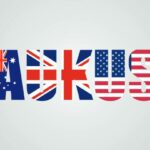The Albanese Government Legislates Away Local Sovereignty to Facilitate US War on China

The currently paused genocide in Gaza has wiped out most noise regarding our nation’s US-led drive toward war on China off the front pages.
Indeed, while the mainstream media has been projecting Israeli propaganda into living rooms nationwide, more than 15,000 Palestinians have been destroyed.
The unquestioning support of western allies for Israel in its commission of multiple and unprecedented war crimes has rocked the legitimacy of the “international rules-based order”, and the Albanese government has shown no deviation in making the entire nation complicit in genocide.
But the China war drive continues, as has clearly been evidenced this week with hawkish defence minister Richard Marles tabling legislation in federal parliament that streamlines defence trade between the three AUKUS pact partners: Australia, the UK and the US.
Introduced on 30 November, the Defence Trade Controls Amendment Bill 2023 provides that certain export goods on the Defence and Strategic Goods List (DSGL) and related services don’t require permits when heading to the US and the UK, and it creates offences for those trading illegitimately.
However, since Albanese dropped the details of the AUKUS deal on the nation in March, the local US-led military buildup to war with China is like nothing this country has ever experienced before.
And while the May designation of Australia as a US domestic military source raised eyebrows, the warnings circulating about the new AUKUS legislation convey a complete loss of local sovereignty.
Open slather
“This bill will bolster Australia’s national security and protect our sensitive defence goods and technology by enhancing our defence trade controls,” Marles told the lower house on 30 November. “It will also unlock defence trade, innovation and collaboration with our AUKUS partners.”
“It aims to prevent military goods and technologies from being transferred to foreign individuals or entities in ways that prejudice Australia’s interests,” the deputy PM continued. “This bill strengthens Australia’s existing export control system by enhancing the protections around” supply.
And in strengthening the controls around defence trading, federal Labor is tearing down restrictions on the trade in defence goods and technology with the US and the UK, which is expected to provide our country with a net benefit of $614 million over the next 10 years.
But this financial reward is being announced right after federal Labor has embroiled the nation in the AUKUS submarine deal, which has seen us agree to a $368 billion price tag for the subs that are not yet guaranteed by US congress and this includes investment in the US and UK naval industries.
Marles stresses that the reforms that Australia is making to its “export control frameworks to support the creation of a licence-free environment between AUKUS partners” are being mirrored in the United Kingdom and the United States.
And while the deputy PM doesn’t remark on how our nation’s economy cowers in comparison to the size of both its individual AUKUS partners, he does admit that the UK and the US haven’t gone as far as Australia in terms of having introduced their own laws to reflect this arrangement as yet.
The guts of the bill
The Amendment alters the Defence Trade Controls Act 2012 (Cth) (the Act) in relation to the Defence and Strategic Goods List 2021 to regulate the supply of military and dual-use goods and technology domestically, in relation to foreign nationals and entities, including the AUKUS powers.
Coming into effect on the 28 August two years ago, the 2021 DSGL lists specific goods, software and technology regulated under export control legislation, which are known as controlled items that require a permit in order to trade, unless there is an exception to this rule.
And in order to give effect to the new arrangements, the bill creates a number of new offences.
Proposed section 10A of the Act creates the offence of supplying DSGL technology to a foreign national within Australia. This occurs when the supplier doesn’t hold a permit and the transfer happens domestically. It carries up to 10 years imprisonment and/or a fine of $782,500.
The offence of supply DSGL goods or technology from outside Australia sits in new section 10B of the Act. Such transactions occur in relation to DSGL exports from an earlier date traded without a permit. And the same penalties as the domestic supply offence apply to this proposed crime.
While a third offence is to be created under new section 10C of the Act. This crime involves a supplier without a permit providing DSGL services to a foreign national locally or abroad. And this offence also carries a decade in prison and the same steep fine as the other two offences.
All three offences are absolute liability crimes, which means a prosecutor does not have to establish intent to convict an accused and neither are any defences based on mental elements available to those charged under such laws.
The Amendment’s explanatory memorandum outlines that the 2023 Defence Strategic Review found that our nation is “facing the most difficult set of strategic circumstances since the Second World War”, so it’s essential that Australia “deepens military interoperability” with the US and the UK.
These offences and the remaining provisions of the bill serve to establish an “export licence-free environment” that “will revolutionise trade among and between AUKUS partners” via “lower technology transfer barriers and costs of trade”.
AUKUS FUKUS
Since the establishment of the 1951 ANZUS treaty, which involves the US, NZ and this nation, Canberra has become growingly dependent upon Washington, and it has followed it into eight foreign theatres of war. Yet this tripartite pact doesn’t require it to assist us if we are under attack.
The interoperability between Australian and US armies, navies and air forces is now in full swing. The issue local political analysts have with this tearing down of barriers between Australia and the White House is that this nation is ever-increasingly morphing into a vassal state of the US.
In 2011, the Labor Gillard government agreed to enter into the US force posture initiatives that were formalised by Abbott in the 2014 Force Posture Agreement, which involves 2,500 US marines on permanent rotation in the north of Australia and increasing interoperability between air forces.
The FPA also provides the US with unimpeded access to dozens of agreed facilities and areas across the continent, which involves the Pentagon taking complete control of any of these installations if it considers upgrading one of them is in its interests.
Recent US renovations at the NT’s RAAF base Tindall have involved storage for six nuclear-capable B-52 bombers. And as our nation respects the US policy of warhead ambiguity, our government won’t know whether these fighters or any other American vessels are carrying nuclear weapons locally.
The escalating US military initiatives and enterprises on local soils have been expanded as of December last year, so that they also incorporate troops from Japan: a member of the strategic Quad alliance – Washington, Canberra, Tokyo and New Delhi – which has Beijing in its sights.
Former Pentagon official Ben Greenwalt, who “wrote much of America’s defence procurement laws,told the ABC this week that Marle’s bill embroils our nation in the “failed US export control system”, and it will result in this nation surrendering “any sovereign capability it develops” to US control.
So, instead of setting up a free two-way exchange of military goods and technology, Greenwalt spells out that our nation is to establish a system that “will allow the US to essentially steal and control Australian technology faster” on the hope that the White House does the same in reverse.
But just as there are no guarantees the AUKUS submarines will ever show up and that the US would send in the troops to defend us in battle, the Australian nation is once again dependent upon the whim of US congress in terms of it passing laws that mirror those Marles has introduced.
And if the US empire has taught us anything over the last century or so, it’s that it only does what’s in its best interests, which have clearly been exposed to be erratic, unjust and made up on the fly since it became the chief backer and wholesale supplier of the Israeli genocide on Gaza.







